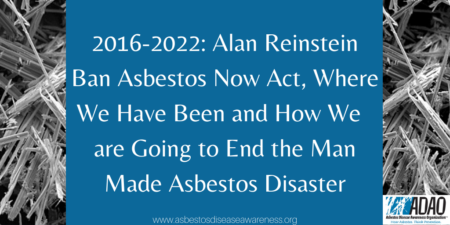Posted on February 15, 2022
Obstacles and Progress in Banning Asbestos Imports and Use
 As we barrel through 2022, we at the Asbestos Disease Awareness Organization (ADAO) are so thrilled with how far we’ve come with the Alan Reinstein Ban Asbestos Now (ARBAN) Act. It is high time for this bipartisan bill to be passed through Congress and signed into law. Not only is it the most comprehensive ban bill put before Congress in over 30 years, but it directly addresses the scourge of legacy asbestos and gives all Americans the right to know where asbestos is imported and used. This includes knowing if any of your products, such as the brakes in your car, the tiles in your bathroom, and the toys in your kid’s toy chest, contain the deadly carcinogen.
As we barrel through 2022, we at the Asbestos Disease Awareness Organization (ADAO) are so thrilled with how far we’ve come with the Alan Reinstein Ban Asbestos Now (ARBAN) Act. It is high time for this bipartisan bill to be passed through Congress and signed into law. Not only is it the most comprehensive ban bill put before Congress in over 30 years, but it directly addresses the scourge of legacy asbestos and gives all Americans the right to know where asbestos is imported and used. This includes knowing if any of your products, such as the brakes in your car, the tiles in your bathroom, and the toys in your kid’s toy chest, contain the deadly carcinogen.
About Asbestos
Asbestos fibers are so small that they are invisible to the naked eye, which means most people do not know when they have been exposed to asbestos. There is no safe level of exposure, and diseases occur when someone inhales the microscopic fibers and they become embedded in the lining of the lungs. Between 1990 -2019, more than 1 million Americans have been afflicted with sickened by and died from asbestos-caused diseases, including mesothelioma and cancer of the lung, larynx, and ovaries.
Many Americans assume that asbestos is a thing of the past, when in fact, asbestos is still legal and lethal in the States today. Millions of homes, schools, and workplaces contain asbestos, and the U.S. still imports hundreds of tons of asbestos into our ports every year. Now a known carcinogen, asbestos is banned in nearly 70 developed and developing countries.
ARBAN has used and continues to use the definition for asbestos provided in the EPA’s Toxic Substances Control Act (TSCA) Asbestos Hazard Emergency Response Act (AHERA), which defines asbestos as the asbestiform varieties of: chrysotile (serpentine); crocidolite (riebeckite); amosite (cummingtonite/grunerite); anthophyllite; tremolite; and actinolite. All fibers known to be highly toxic to the human body at any and all levels of exposure.
ARBAN Then & Now
Two years ago, ARBAN was voted out of the U.S. House of Representatives Committee on Energy and Commerce (E&C) with a vote of 47-1. Due to the Covid-19 pandemic and other national issues, we have not been able to get the bill to the House floor for a vote since. Despite the delay, we know that the bill still has incredible support on both sides of the aisle, and a long list of stakeholders, experts, and scientists to who back it.
ARBAN was first introduced Senator Jeff Merkley and Representative Suzanne Bonamici in 2017 and although we worked hard to garner Congressional support, it was delayed until the 2nd ARBAN introduced in March 2019 by Senator Jeff Merkley and Representative Suzanne Bonamici. And ARBAN, as an amendment to the Toxic Substances Control Act, ARBAN will: (1) ban the importation and commercial use of asbestos and asbestos-containing products within one year of enactment; (2) require chlor-alkali plants to eliminate the use of asbestos and convert to non-asbestos technology; (3) study legacy asbestos.
3 Reasons We Need to ARBAN to Ban Asbestos
- An estimated 40,000 Americans die each year from preventable asbestos-caused diseases.
- Hundreds of metric tons of asbestos imports and use continued each year.
- Without a ban, Americans remain at risk to exposure just by going about their everyday lives. Asbestos will continue to be found in homes, schools, workplaces, and even on consumer shelves.
Time for Action
In the two years since ARBAN was passed out of the House Energy and Commerce Committee, we have lost over 80,000 people to asbestos-caused diseases in the United States alone. We owe it to the hundreds of thousands of Americans who have died since then from asbestos-caused illnesses. A review of these regulations and agencies could easily clear the air, ban asbestos importation, and save thousands of lives in the process. There is no time to waste when more lives are at stake daily, the time to ban asbestos is now.
Take action — Sign the Petition to the U.S. Environmental Protection Agency to Ban Asbestos in the US Now, Without Loopholes or Exemptions.
Linda Reinstein
Social Networks

